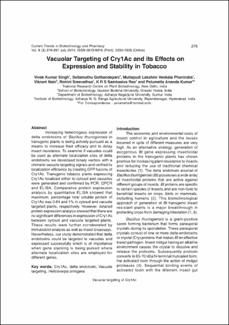Mostrar el registro sencillo del ítem
Vacuolar Targeting of Cry1Ac and its Effects on Expression and Stability in Tobacco.
| dc.contributor.author | Singh, Vivek Kumar | |
| dc.contributor.author | Gothandapani, Sellamuthu | |
| dc.contributor.author | Phanindra, Mullapudi Lakshmi Venkata | |
| dc.contributor.author | Nain, Vikrant | |
| dc.contributor.author | Sreevathsa, Rohini | |
| dc.contributor.author | Rao, KS Jagannatha | |
| dc.contributor.author | Kumar, Polumetla Ananda | |
| dc.date.accessioned | 2020-07-03T21:17:43Z | |
| dc.date.available | 2020-07-03T21:17:43Z | |
| dc.date.issued | 2014-07-01 | |
| dc.identifier.issn | 2230-7303 | |
| dc.identifier.uri | http://repositorio-indicasat.org.pa/handle/123456789/166 | |
| dc.description | Increasing heterologous expression of delta endotoxins of Bacillus thuringiensis in transgenic plants is being actively pursued as a means to increase their efficacy and to delay insect resistance. To examine if vacuoles could be used as alternate localization sites of delta endotoxins we developed binary vectors with a chimeric vacuole targeting signals and verified its localization efficiency by creating GFP fusions of Cry1Ac. Transgenic tobacco plants expressing Cry1Ac localized either to cytosol and vacuoles were generated and confirmed by PCR, QPCR and ELISA. Comparative protein expression analysis by quantitative ELISA showed that maximum, percentage total soluble protein of Cry1Ac was 0.64 and 1% in cytosol and vacuole targeted plants, respectively. However, detailed protein expression analysis showed that there are no significant differences in expression of Cry1Ac between cytosol and vacuole targeted plants. These results were further corroborated by immunoblot analysis as well as insect bioassays. Nevertheless, our study demonstrated that delta endotoxins could be targeted to vacuoles and expressed successfully which is of importance when gene stacking is being pursed where alternate localization sites are employed for different genes. | en_US |
| dc.description.abstract | Increasing heterologous expression of delta endotoxins of Bacillus thuringiensis in transgenic plants is being actively pursued as a means to increase their efficacy and to delay insect resistance. To examine if vacuoles could be used as alternate localization sites of delta endotoxins we developed binary vectors with a chimeric vacuole targeting signals and verified its localization efficiency by creating GFP fusions of Cry1Ac. Transgenic tobacco plants expressing Cry1Ac localized either to cytosol and vacuoles were generated and confirmed by PCR, QPCR and ELISA. Comparative protein expression analysis by quantitative ELISA showed that maximum, percentage total soluble protein of Cry1Ac was 0.64 and 1% in cytosol and vacuole targeted plants, respectively. However, detailed protein expression analysis showed that there are no significant differences in expression of Cry1Ac between cytosol and vacuole targeted plants. These results were further corroborated by immunoblot analysis as well as insect bioassays. Nevertheless, our study demonstrated that delta endotoxins could be targeted to vacuoles and expressed successfully which is of importance when gene stacking is being pursed where alternate localization sites are employed for different genes. | en_US |
| dc.language.iso | en | en_US |
| dc.subject | Cry1Ac | en_US |
| dc.subject | delta endotoxin | en_US |
| dc.subject | Vacuole targeting | en_US |
| dc.subject | Helicoverpa armigera | en_US |
| dc.title | Vacuolar Targeting of Cry1Ac and its Effects on Expression and Stability in Tobacco. | en_US |
| dc.type | Article | en_US |

